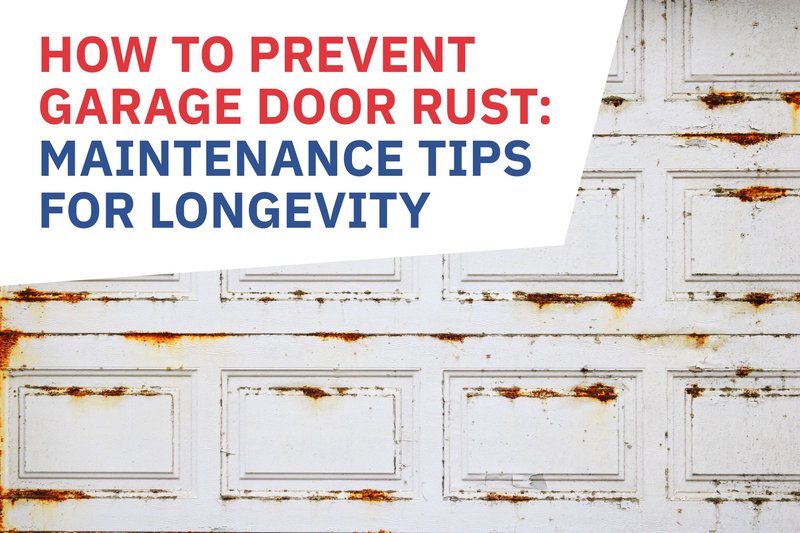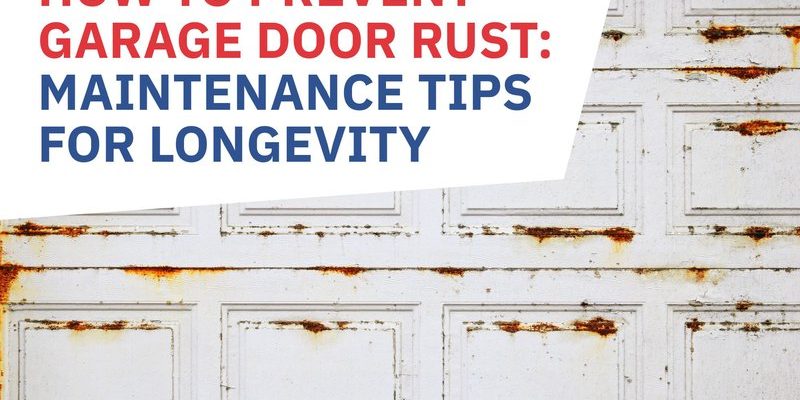
Imagine you’re enjoying a sunny day, and suddenly, the door won’t budge. That’s where rust and corrosion can sneak in and ruin things. If rust forms, it can create a gridlock that slows down the entire opener. Preventing this wear-and-tear is crucial for a seamless garage experience. Let’s dive into some practical ways to keep your garage door opener components, such as the motor, springs, and tracks, free from rust and corrosion.
Understanding Rust And Corrosion
Rust and corrosion sound similar, but they’re a bit different. Rust is specifically what happens to iron and its alloys when they’re exposed to oxygen and moisture over time. When this happens, you get that reddish-brown flaky mess that doesn’t just look bad but can also weaken the material. On the other hand, corrosion can affect various metals, including aluminum and copper, not just iron. It refers to the deterioration of metals due to reactions with their environment.
But you might wonder, why does this even matter for my garage door opener? When components become rusty or corroded, they can lead to mechanical failures or, worse, safety hazards. You may find your door doesn’t open or close correctly, putting your possessions at risk and creating a hassle.
Regular Inspection Of Components
The first line of defense against rust and corrosion is a regular inspection. You benefit when you break out that flashlight and check your garage door opener. Ideally, you should do this every few months, but if you live in a humid area, consider inspecting it more often.
What should you look for? Focus on these parts:
- Motor housing: Check for any signs of wear or moisture accumulation.
- Springs: Ensure they aren’t showing signs of rusting.
- Tracks: Inspect them for any deterioration.
Finding an issue early can save you a lot of hassle later on. If you notice rust or corrosion, it’s best to tackle it right away rather than waiting for it to worsen.
Applying Protective Coatings
Did you know that a little extra protection can go a long way? Applying protective coatings to metal components can shield them from moisture and air. Things like rust-inhibiting spray or a specialized metal wax can help seal surfaces, keeping them safe from the elements.
Here’s how to do it:
1. Clean the Surface: Before applying any coating, make sure to clean the parts thoroughly. Remove any dirt and grime that could interfere with adhesion.
2. Apply the Coating: Use a painter’s brush or spray to apply an even layer over exposed metal. Be cautious and avoid over-saturation.
3. Let It Dry: Give it some time to dry and cure properly. Follow the manufacturer’s instructions regarding drying time.
Not only can this step prevent rust, but it can also improve the overall durability of your garage door opener.
Keeping Things Dry: Proper Drainage
Another straightforward solution is ensuring your garage has proper drainage. Moisture is the enemy when it comes to rust and corrosion. If your garage tends to collect water, consider these solutions:
- Floor Mats: Use absorbent mats to soak up water that drips in from outside.
- Seal Cracks: Repair any cracks or gaps in the walls or floor that might let water in.
- Install a Drain: If water consistently pools, consider installing a drain to guide water away from the opener.
By directing water away, you can significantly lower the chances of rust forming on your garage door opener components.
Lubrication: A Simple, Effective Solution
Let’s talk about lubrication — it’s not just for the moving parts of your garage door opener, but it also plays a role in rust prevention. A good lubricant helps repel moisture, thus creating a barrier against rust.
To keep it simple, follow these steps:
1. Choose the Right Lubricant: Look for options designed for garage doors, typically silicone-based products. Avoid oil-based lubricants, as they can attract dirt and accelerate wear.
2. Apply Sparingly: Use a clean cloth to apply a thin layer on parts like springs, hinges, and rollers. Less is often more here.
3. Regular Maintenance: Keep it up! Apply lubricant every few months, especially in harsher climates.
Lubrication not only helps prevent rust but also promotes smooth operation.
Storage Solutions for Your Garage Opener Remote
Your garage door opener remote is essential, but did you know its storage can also influence the possibility of rust? When accidentally exposed to moisture, these electronics can suffer. Try these simple storage solutions:
1. Keep it Dry: Always store your remote in a dry, easily accessible place. A drawer or a dedicated wall hook can work well.
2. Use a Protective Case: Consider placing your remote in a silicone or plastic case, especially if you live in a humid area.
3. Avoid High Humidity: If your garage is prone to high humidity, think about using a dehumidifier to reduce moisture levels.
{{
}} Just like your favorite book deserves a nice shelf, your garage door remote deserves a dry home! {{
}}
By keeping the remote safe, you’re limiting exposure to humidity and moisture, which contributes to rusting.
Consider Upgrading to Rust-Resistant Materials
If your garage door opener’s components are older and heavily corroded, you might want to think about upgrading to rust-resistant materials. Today, many options are designed to withstand the elements better than traditional materials.
Here’s why it’s worth considering:
- Durability: Stainless steel and galvanized metals resist rust better than standard steel.
- Longer Lifespan: Investing in better materials can save you money in repairs and replacements.
- Safety First: A more reliable opener equals a more secure home.
Although this may require a bit more upfront investment, you’re essentially safeguarding your entire garage door system from the detrimental effects of rust and corrosion.
Regular Cleaning Techniques
Keeping your garage door opener clean is essential for rust prevention. Dust and dirt can trap moisture, leading to corrosion issues over time. Here’s a simple cleaning routine to keep everything in pristine condition:
1. Dust Regularly: Wipe down surfaces with a dry cloth to remove dust and debris.
2. Deep Clean Occasionally: Use a mild detergent and water solution for a thorough clean every few months. Avoid harsh chemicals that could damage the finish.
3. Don’t Forget Corners: Pay special attention to corners and crevices where moisture can gather.
This simple routine requires minimal effort but will go a long way in preserving your opener’s condition.
Timing for Maintenance
When should you schedule maintenance for your garage door opener? Here are key times to consider:
- Before Winter: Cold months can be harsh, so inspect and prepare before the frost sets in.
- After Rain or Snow: Check for any moisture accumulation that might have arisen from recent storms.
- Before Extended Absences: If you plan to be away for an extended period, a quick maintenance check is a smart move.
Taking action at these times will help you stay ahead of any potential rust or corrosion issues.
In the grand tapestry of homeownership, maintaining your garage door opener is often an overlooked thread. But just like that trusty bicycle from earlier, giving your opener a little TLC can significantly prolong its life. By following the simple tips outlined—like regular inspections, applying protective coatings, and keeping components clean—you can effectively prevent rust and corrosion.
So, take that time to protect your investment! A well-maintained opener means fewer headaches, safer storage, and peace of mind every time you press the remote. Your garage door opener deserves that kind of care.
